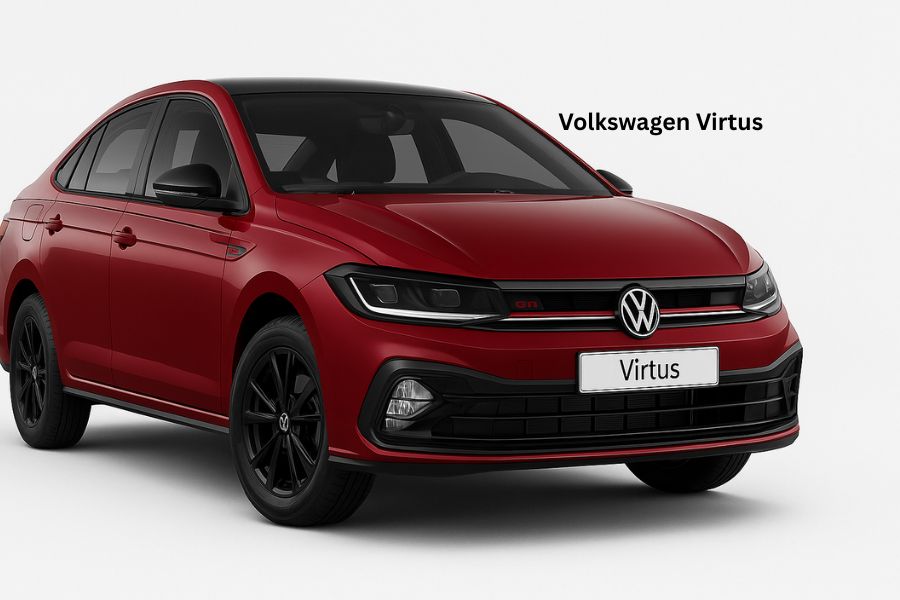The Volkswagen Virtus has emerged as a promising contender in India’s mid-size sedan segment. Introduced as a replacement for the aging Volkswagen Vento, the Virtus carries forward the legacy of German engineering, sophistication, and performance.
With a dynamic design, powerful engine options, and a feature-rich cabin, the Virtus is aimed at discerning customers who appreciate both form and function. In this article, we take a deep dive into the design, performance, interior features, safety, technology, fuel efficiency, and overall value proposition of the Volkswagen Virtus.
Volkswagen Virtus: Striking Design and Bold Road Presence
The Volkswagen Virtus stands out in a crowd of sedans with its bold and modern design. Built on the MQB A0 IN platform, the Virtus exudes a sharp European character that is immediately noticeable. The front fascia is dominated by a wide grille with chrome accents, flanked by sleek LED headlights that seamlessly integrate with the design. The sculpted bonnet and muscular bumper add to its aggressive yet premium appeal.
The side profile showcases a clean and elongated silhouette, emphasizing its class-leading length and wheelbase. Chrome window lining, sharp character lines, and large alloy wheels enhance its visual appeal. At the rear, the car boasts sleek LED tail lamps connected with a blacked-out strip, a sporty bumper, and a subtle lip spoiler on the boot lid. Overall, the Virtus’s design is a perfect blend of sportiness and elegance, making it one of the best-looking sedans in the segment.
Volkswagen Virtus: Spacious and Feature-Rich Cabin
Step inside the Volkswagen Virtus, and you’re greeted with a well-laid-out cabin that is both spacious and premium. The dual-tone dashboard, soft-touch materials, and piano black inserts offer a luxurious feel. The layout is driver-centric, with all controls within easy reach. The fit and finish are top-notch, living up to Volkswagen’s reputation for quality interiors.
The Virtus offers one of the most spacious cabins in its segment. With a length of over 4.5 meters and a wheelbase of 2651 mm, it ensures ample legroom and headroom for both front and rear passengers. The seats are well-contoured and offer excellent support for long journeys. The rear seat comes with a center armrest, rear AC vents, and adjustable headrests, ensuring a comfortable ride for three passengers.
In terms of features, the Virtus leaves no stone unturned. The car comes equipped with a 10.1-inch touchscreen infotainment system with Android Auto and Apple CarPlay, a fully digital instrument cluster, ventilated front seats, wireless charging, ambient lighting, automatic climate control, a sunroof, and a premium 8-speaker sound system. The GT Line variant even adds a sportier red theme, aluminum pedals, and GT badging on seats for an added dose of excitement.
Volkswagen Virtus: Engine Options and Performance
Under the hood, the Volkswagen Virtus offers two turbo-petrol engine options that cater to different driving preferences. The entry-level engine is a 1.0-litre TSI 3-cylinder unit that produces 115 PS of power and 178 Nm of torque. It is paired with either a 6-speed manual gearbox or a 6-speed torque converter automatic transmission. This engine is ideal for urban commuting and offers a smooth and refined driving experience with a decent punch when needed.
For enthusiasts who crave more power, the Virtus GT Line is offered with a 1.5-litre TSI EVO 4-cylinder turbocharged petrol engine that churns out an impressive 150 PS of power and 250 Nm of torque. This engine comes mated to a 7-speed DSG (dual-clutch) automatic transmission that ensures lightning-f; ast gear shifts and exhilarating performance. The 1.5 TSI also features cylinder deactivation technology, which shuts off two cylinders under low-load conditions to improve fuel efficiency without compromising performance.
The Virtus excels in ride and handling, delivering the typical German balance of comfort and sportiness. The suspension is tuned to handle Indian road conditions with ease, offering a plush ride over rough patches while remaining composed at high speeds. The steering is precise, and the car feels confident around corners, making it one of the most fun-to-drive sedans in its class.
Volkswagen Virtus: Fuel Efficiency and Real-World Economy
Despite its performance-oriented nature, the Volkswagen Virtus delivers competitive fuel efficiency figures. The 1.0-litre TSI engine returns a claimed mileage of around 19.4 kmpl with the manual transmission and 18.1 kmpl with the automatic. The more powerful 1.5-litre TSI engine, thanks to its active cylinder technology, offers an ARAI-certified mileage of 18.67 kmpl. These figures may vary in real-world conditions, but both engines offer a good balance between performance and economy.
Owners have reported real-world mileage figures of around 13–15 kmpl in city traffic for the 1.0 TSI and 11–13 kmpl for the 1.5 TSI. On highways, the mileage can go up to 17–20 kmpl depending on driving style and traffic conditions. These numbers make the Virtus a viable daily driver as well as a great option for long road trips.
Volkswagen Virtus: Safety Features and Build Quality
Volkswagen Virtus has always prioritized safety, and the Virtus is no exception. The car is built on the MQB A0 IN platform, which is known for its structural rigidity and crash protection. The Virtus boasts a robust body shell with extensive use of high-strength steel, enhancing passenger protection during impacts.
The standard safety kit on the Virtus includes dual front airbags, ABS with EBD, electronic stability control (ESC), traction control, hill-hold assist, and rear parking sensors. The higher variants add side and curtain airbags, a rearview camera, tyre pressure monitoring system (TPMS), and ISOFIX child seat mounts. The car has not been officially crash-tested by GNCAP yet, but based on the performance of other MQB A0 IN-based models like the Taigun and Skoda Slavia, it is expected to fare very well in safety tests.
Volkswagen Virtus: Advanced Infotainment and Connectivity
The Volkswagen Virtus embraces modern technology with a host of connected and smart features. The centerpiece of the dashboard is the 10.1-inch touchscreen infotainment system, which offers a crisp display and intuitive interface. It supports wireless Android Auto and Apple CarPlay, allowing seamless smartphone integration. The system also includes gesture control and voice commands for ease of use.
Volkswagen’s My Volkswagen Connect app adds connected car features to the Virtus, enabling remote vehicle tracking, driving behavior analysis, geo-fencing, emergency assistance, and real-time vehicle diagnostics. This digital ecosystem adds a layer of convenience and peace of mind for tech-savvy users.
The fully digital 8-inch instrument cluster offers customizable views that display navigation, driving data, fuel economy, and safety alerts in real time. This digital cockpit elevates the overall driving experience and provides essential information at a glance.
Volkswagen Virtus: Ride Quality and Comfort Over Long Distances
One of the highlights of the Virtus is its superb ride quality. Whether you’re navigating pothole-ridden city streets or cruising on the highway, the suspension soaks up bumps with ease, maintaining a calm and composed cabin. The seats are ergonomically designed, offering excellent thigh and back support.
The NVH (Noise, Vibration, Harshness) levels are also well controlled. Road noise and engine sound are effectively dampened, giving the cabin a serene and premium ambiance. The sound insulation, combined with the high-quality music system, makes the Virtus a pleasant place for both drivers and passengers during long journeys.
Rear passengers are treated to ample legroom and a well-reclined seat back, ensuring comfort even on extended drives. The boot space of 521 liters is among the best in the segment, easily accommodating luggage for weekend trips or family outings.
Volkswagen Virtus: Variants and Pricing
The Volkswagen Virtus is available in multiple variants to cater to a wide range of buyers. The 1.0 TSI engine is offered in Comfortline, Highline, and Topline trims, while the 1.5 TSI EVO engine is exclusive to the GT Plus trim. The pricing for the Virtus starts at around ₹11.56 lakh (ex-showroom) for the base Comfortline variant and goes up to ₹19.15 lakh (ex-showroom) for the fully loaded GT Plus DSG variant.
The pricing is competitive, especially considering the level of equipment, performance, and brand value on offer. For buyers looking for a stylish, safe, and fun-to-drive sedan with modern features, the Virtus offers solid value for money in its segment.
Volkswagen Virtus: Comparisons with Rivals
The Volkswagen Virtus competes in the mid-size sedan segment, going head-to-head with rivals like the Honda City, Hyundai Verna, Maruti Suzuki Ciaz, and Skoda Slavia. Compared to the Honda City, the Virtus offers more powerful turbo-petrol engines and a sportier driving experience. While the City excels in rear seat comfort and brand legacy, the Virtus wins in build quality and premium appeal.
The Hyundai Verna recently received a major update with futuristic styling and segment-first features like ADAS. However, the Virtus counters with more natural handling, better steering feedback, and solid German build quality. The Maruti Ciaz, although the most affordable in the segment, falls short in terms of features, performance, and modern appeal.
Its closest sibling, the Skoda Slavia, shares the same platform and engines. The main difference lies in the design language and brand identity, with the Virtus offering a more elegant appearance compared to the bold and edgy styling of the Slavia.
Volkswagen Virtus: After-Sales Service and Maintenance
Volkswagen Virtus has made considerable efforts to improve its after-sales service experience in India. The company offers service cost transparency, extended warranty options up to 7 years, and attractive service packages. With the Virtus, Volkswagen is also offering up to 4 years of standard warranty, with roadside assistance and service intervals of 15,000 km or 1 year.
In terms of maintenance, the Virtus benefits from high localization levels, which helps keep the ownership cost relatively lower compared to older Volkswagen models. The company has also introduced service cost calculators and service value packages that cover routine maintenance at discounted rates, making ownership more affordable in the long run.
Volkswagen Virtus: Conclusion A Sedan That Ticks All the Right Boxes
The Volkswagen Virtus is a refreshing and well-rounded offering in the mid-size sedan space. It combines German engineering with modern design, powerful yet efficient engines, premium interiors, and a comprehensive list of features. Whether you’re a driving enthusiast or a family buyer seeking comfort and practicality, the Virtus delivers on multiple fronts.
Its road presence, refined performance, spacious cabin, and strong safety credentials make it a compelling alternative to SUVs in a market dominated by them. With the Volkswagen Virtus, the brand has managed to create a sedan that is not only aspirational but also highly practical, redefining what a premium mid-size sedan should be in today’s context.

